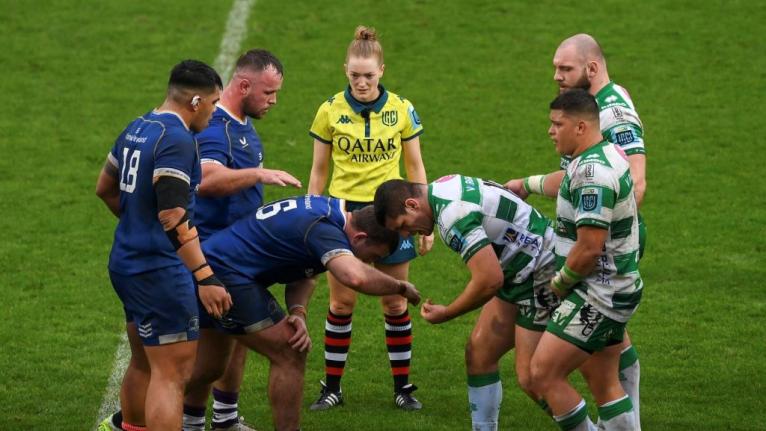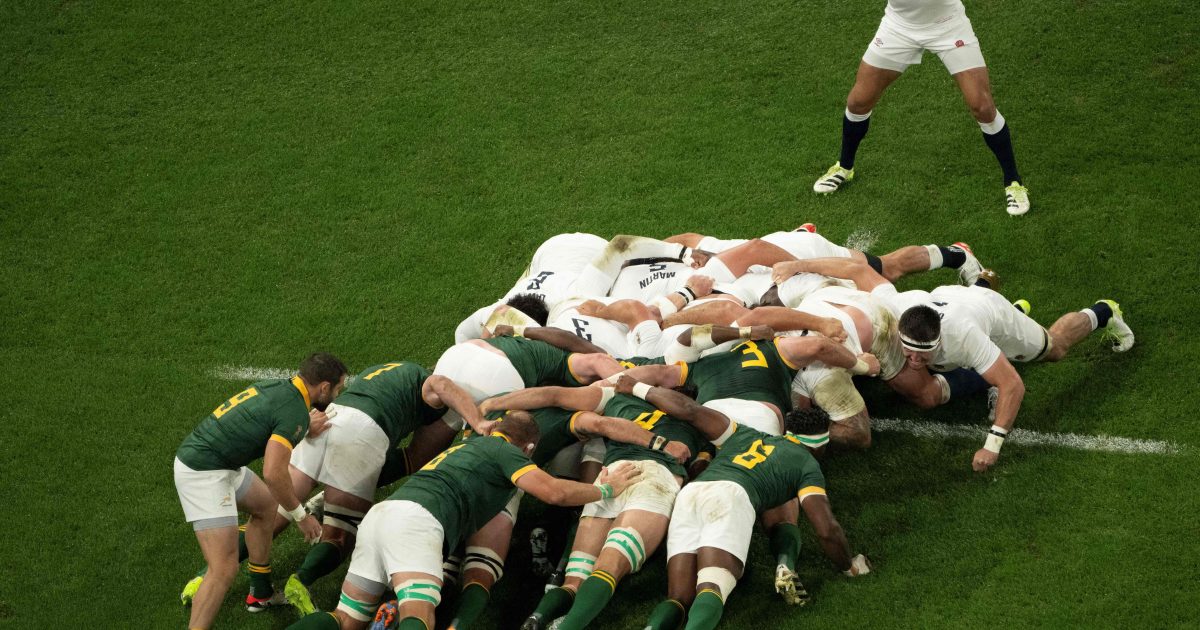The no scrum from free-kick uproar is overblown - Andy Goode

The law changes being introduced across the game in July should help speed up play, improve the spectacle and reduce injuries, what’s not to like.
I thought the crocodile roll had been outlawed a while ago so that one’s overdue and everyone knew the scrapping of the so-called ‘Dupont law’ was coming at the first available opportunity so there’s no surprise there.
The most controversial one by far is making it no longer possible to choose a scrum from a free-kick and, despite the uproar on social media, I think it could be a positive move as long as we ensure it isn’t a step towards depowering the set piece and referees are able to police teams trying to pull a fast one.
I’m not sure I would’ve thought it was a problem that needed solving but I can completely see why you wouldn’t want all the time spent on setting a scrum after some more minor technical offences and I don’t think it’s going to drastically change the game.

Of course, South Africans are being vociferous in their view that it’s an attempt to combat one of their main strengths. That feeling runs even deeper after they opted for a scrum from a mark at the World Cup but that is so rare and I don’t think this is a response to that.
You can still call for a scrum from a penalty if you want and I do understand the concerns around teams with weaker scrums potentially deliberately infringing at the set piece in order to not have to scrummage but referees will surely be told to crack down on that.
You can’t infringe more than once as it is without a referee awarding a penalty so we won’t see teams getting away with multiple early engagements and such like so as not to have to pack down against a stronger scrummaging unit.
As is so often the case with rugby, the laws are one thing but it’s the policing, interpretation and implementation of them by referees that will determine whether this is a success or not.
If they allow teams to get away with certain acts that are intended to deliberately avoid scrummaging, then we could be in trouble, but I’m sure it’ll have been spoken about behind the scenes and officials won’t allow that to happen.
I’m completely on board with the sentiments of those people that are concerned by this law change because I think the scrum has to remain central to our sport and not be depowered at all, I just think this probably won’t have a massive effect.

As well as being a huge part of the game in their own right, scrums tire out the big men and create space for others to exploit off the back of them. They add to the entertainment factor rather than detracting from it and we don’t want to become a 15-man rugby league.
My main worry with this law change would be if coaches start outsmarting referees to achieve those marginal gains in the short term but if the officials are able to use their common sense as well as implement the laws, that shouldn’t be the case.
I can guarantee that coaches will be talking to their props and making sure they’re aware of all the ways they can subtly give a free kick away, rather than a full penalty, if their scrum is under pressure and that would then temporarily depower the opposition set piece.
Rugby is a multifaceted sport and teams should be rewarded for having a strong scrum so that can’t be allowed to happen and if it does, then perhaps a rethink will be needed but I think we should give referees the tools and trust them to police it properly.
Ultimately, this is all about speeding up restarts to improve the spectacle and that is to be applauded. Interestingly, there are law trials being introduced in certain competitions that include a 30-second shot clock for scrum and lineout setting and I think that’s where we may end up.

Either that or just stop the clock and restart it when the ball is put into the scrum and have a more American football style attitude towards the clock and it being controlled more strictly by the timekeeper.
As human beings we don’t tend to like change but it’s often necessary and leads to an improvement overall. The proof will be in the pudding and we’ll need to see how this all works in practice so I might be wrong but I think it’s easy to rush to judgement.
No crocodile rolls improves safety, players needing to put themselves onside will avoid dull kick battles while also tiring players out more and creating space and not being able to choose a scrum from a free-kick speeds up restarts.
All in all, referees need to make sure they’re hot on coaches and teams not exploiting these new laws to gain an advantage and protect the scrum from being depowered but if they do that, change will be a good thing.




























The game was changing too much with teams trying to role the dice drawing fouls. Would be better if scrums and the adjudicating problems were resolved but this is a good immediate fix.
Nice article
All of the Moderna law changes have been to slow the game down, playing into the hands of SA and the north. Incentivising boring, negative rugby.
Brilliant changes. Speed up the game.
Brilliant if you want rugby union to become rugby league where all body types are no longer welcome. League is a game for jocks
Imagine you kick to the lineout, they give away a free kick, you have a great chance at a scrum, sorry sir you have to tap and go. Ridiculous
Give away a free kick how?
You don’t like using the rugby ball in rugby?
Yeah. I’d really like to know how they’re going to referee free-kick level infringements.
In your lineout scenario - the attacking team has setup a lineout. Presumably from a penalty?
It’s a <22m attacking lineout and the defending team gives away a free kick, to avoid an attacking maul. What types of infringement would give away a free kick in that scenario? That wouldn’t be a straight penalty? Numbers?
On the flip side. The attacking team’s throw in is not straight. The defending team now has to kick or tap and go. They’ll obviously kick - a pretty normal outcome.
Why do some Bok fans get so defensive when people have opinions on how the game should be played? Is it really necessary to take it as a personal attack on SA every time?
Imagine they say you don’t have to stay 10m being the lineout anymore. Think NZ teams will like this? It’s a clear ploy to depower the boks who won the RWC against the script.
If they hadn't suddenly deleted the ‘mark-kick’ I might just have believed you.
It’s because we love the game of rugby so much Peter.
Any attack on the game will inevitably be taken personally by Saffas.
Anybody can see that law changes the past decade have mainly been to make Union more like League. At this rate it is inevitable that we are going to end up with a 15-man version of League.
Is that what the rugby fans want? I don’t think so.
Most of the changes these past few years have made the game worse. They don’t know what they’re doing. Clueless
Ah yes Andy with his “Goode” views. Oke might as well come out and say it, “I like seeing South African scrums depowered in order to give the rest of the world a chance”.
Somehow he thinks World Rugby always knew about calling scrums from marks and it just so happened to coincide with Damien Willemse’s call that they decided to change the rules.
Ah come on, if he can't see it then he needs prescription glasses. No ways, they are doing this for the betterment of Rugby. They want to clamp down on Rassie’s innovative skills than encouraging coaches to think outside of the box to try new things. What they can't count on is what Rassie will plan next.
I almost get the impression that once Rassie retires World Rugby is going to be scrabbling around trying to find their identity. Currently set at ARP (Anti-Rassie Party). Although I don't really care in that regard because they always a RWC step behind.
I normally try and reason or understand peoples view Roger, but if you truly think this change has anything to with taking scrums from marks, instead of just kicking the ball out, I cannot see myself getting anywhere.
I’ll just say this. It’s done to speed the game up everywhere else on the park where a free kick is awarded. If you get a free kick (like from a mark, or any of the other means) inside the 22 you kick it out, if it’s outside the 22 you’d always take a scrum (other than perhaps Ireland).
Andy Goode just loves to be controversial.
Its boring. Let’s all stop reading.
Didn’t read it.
I mean, what could possibly be in the article that would be worth reading which wasn’t in the first half a dozen on the topic? Overblown comments though are worth reading!
Ah yes, the opinion of Andy Goode…
Andy Goode, the man who knows what some of the Irish players said to Eben Etzebeth after the QF, better than what Eben himself knows.
And, judging by this piece, the Grandmaster of clichés.
I’ve hated Andy Goode for a while, but i’ve actually grown quite fond of him since the snowflakes got upset by his words about liar and hypocrite Eben Etzebeth.
I think this is a fair view. As a South African I am concerned about the depowering of the scrum but let’s be honest, until the SA vs FRA quarter many people didn’t even know you could take a scrum from a free kick. As you say it’s going to come down to interpretation… until then we don’t really know how this is going to impact the game.
That would lead to my own objection. Do the unknowns of changing a law outweigh the cons of said law. With such an obscure law that most people had never heard of, one that had never really had an impact on the game in the first place is it worth changing to invite so much uncertainty. Better the devil you know then the devil you don’t as it were…
Take a scrum from a mark you mean Luke.
My objection is that you would comment on something you obviously haven’t thought about very much. First understand what’s happening, then come up with a possible unknown that is a con. Abstract thinking can be hard for those that don’t use it, but unless you’ve got something theres no point posting.
WR have obviously done that and said the unknowns do not outweigh the cons, all that’s left is to wait and see. What can be said now, is that we don’t have a lot of faith in WR making the right decision.
I think everyone knew you could take a scrum from a free kick, it happens quite regularly.